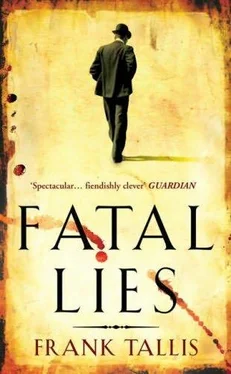Frank Tallis - Fatal Lies
Здесь есть возможность читать онлайн «Frank Tallis - Fatal Lies» весь текст электронной книги совершенно бесплатно (целиком полную версию без сокращений). В некоторых случаях можно слушать аудио, скачать через торрент в формате fb2 и присутствует краткое содержание. Жанр: Исторический детектив, на английском языке. Описание произведения, (предисловие) а так же отзывы посетителей доступны на портале библиотеки ЛибКат.
- Название:Fatal Lies
- Автор:
- Жанр:
- Год:неизвестен
- ISBN:нет данных
- Рейтинг книги:3 / 5. Голосов: 1
-
Избранное:Добавить в избранное
- Отзывы:
-
Ваша оценка:
- 60
- 1
- 2
- 3
- 4
- 5
Fatal Lies: краткое содержание, описание и аннотация
Предлагаем к чтению аннотацию, описание, краткое содержание или предисловие (зависит от того, что написал сам автор книги «Fatal Lies»). Если вы не нашли необходимую информацию о книге — напишите в комментариях, мы постараемся отыскать её.
Fatal Lies — читать онлайн бесплатно полную книгу (весь текст) целиком
Ниже представлен текст книги, разбитый по страницам. Система сохранения места последней прочитанной страницы, позволяет с удобством читать онлайн бесплатно книгу «Fatal Lies», без необходимости каждый раз заново искать на чём Вы остановились. Поставьте закладку, и сможете в любой момент перейти на страницу, на которой закончили чтение.
Интервал:
Закладка:
“Only three left, Drexler,” Wolf said. “Your turn.”
Drexler looked at the gun, and then at Wolf. He cocked the hammer. The distance that he usually interposed between himself and the world had suddenly vanished. Reality stormed the ramparts of his senses, and he became acutely aware of the minutiae of existence: the systolic and diastolic components of his pulse, the expansion and contraction of his lungs, the passage of air in his nostrils, the taste of metal in his mouth, and the lost room, with its familiar contents- the suitcase, the wicker chair (and the permanent fragrance of tobacco, fear, and erotic discharge)-this haven of shabby delights- every part of it acquired a vivid immediacy. He was alive and he did not want to die.
“This is absurd,” said Drexler. He lifted the revolver and looked into the end of its barrel. Its circularity suggested eternity, and its blackness oblivion. There were other things he could be doing at this moment in time: making love to Snjezana, reading Hoffmann, or simply smoking on the grounds and watching the moon rise. He shook his head.
“Oh, you're all insane,” he said contemptuously, tossing the revolver aside. It landed a few feet away. There was a loud report, a bright flash, and a hazy cloud of gunpowder smoke rose up like a spectral apparition.
“My God,” said Steininger.
“It… it was live!” gasped Freitag.
In their state of shock, the two lieutenants had loosened their grip on Perger's tunic. The prisoner fell forward and sprawled facedown on the floor.
“Get up, Perger,” said Wolf.
The boy did not reply.
Wolf nudged him with his foot. The body was inert.
“Get up, Perger,” Wolf repeated.
Drexler fell to his knees and rolled the body over.
“Oh no… God, no.” A dark stain had appeared on Perger's tunic.
Silence.
“What shall we do, Wolf?” said Freitag softly.
Steininger took a step back. The color had drained from his face. He was fearful, dismayed.
“Perger?” said Drexler, pushing at the body. “Perger? Can you hear me?”
There was no response. The dark stain was expanding-an almost perfect circle, close to Perger's heart.
“Christ,” said Steininger. “He's dead.”
“No,” said Freitag. “He can't be…”
Drexler grasped the fallen boy's hand. “Come on, Perger, wake up!”
“It's no good, Drexler,” whispered Wolf. “You've killed him.”
“Me?”
“Yes, you! It was you who had the gun last.”
“But it wasn't my…,” cried Drexler, incoherent with desperation. “I didn't… I…”
“Wolf's right, Drexler,” said Steininger. “It was you who had the gun last.”
“Yes,” Freitag agreed. “If you hadn't thrown the gun, Perger would still be alive.”
42
Inspector Rheinhardt had copied the number pairs from Zelenka's exercise books onto a single sheet of paper, which he now handed to Amelia Lyd gate. The Englishwoman fell silent, and simply stared at the figures. Time passed. She was obviously attempting to decipher them, and Rheinhardt was reluctant to disturb her. He glanced across the room at Haussmann and raised a finger to his lips.
Eventually Amelia looked up.
“Are you absolutely sure that these numbers represent coded messages, Inspector?”
“Well, not absolutely… However, it was Dr. Liebermann's opinion that Herr Sommer did not tell us the truth when he said that these numbers were a memory test, and I am inclined to agree. The commitment of random number pairs to memory is surely an activity from which both pupil and master would derive very limited plea sure. And such an activity would be unlikely to keep them amused over a period of several months. Therefore, if the numbers are not a memory test, then they must be some kind of code.”
A vertical crease appeared on Amelia's brow.
“My father-also a schoolmaster-insisted that I learn the value of the mathematical constant pi to fifty decimal places. Successful recitations were the source of considerable pleasure and amusement to both of us. Indeed, my father could barely stop himself from joining in when I reached the final ten digits: six, nine, three, nine, nine, three, seven, five, one, zero. There! I can still recall the sequence quite clearly. For those who enjoy mathematics, numbers can be a very satisfying entertainment; however, it is undoubtedly the case that for the nonnumerical such pleasures are as recondite as music is to the tone-deaf.”
Rheinhardt did not know how to respond. He glanced at Haussmann, tacitly requesting assistance, only to discover that the young scoundrel was biting his lower lip and that his shoulders were shaking with suppressed laughter.
“Indeed,” said Rheinhardt. “Indeed…” He twisted the waxed horns of his mustache and said: “Am I to take it, then, that you do not share our view?”
“I am not taking issue with your conclusion, Inspector-merely the reasoning that you employed to reach that conclusion.”
“Ah,” said Rheinhardt, more encouraged. “Then you accept that the numbers might be a code?”
“Yes,” she said, a little hesitantly. “But if they are, the code is not conventional. That much I can determine already.”
“I see.”
“May I take this with me?” She raised the paper in her gloved hand.
“Yes, of course.”
“I will give it careful consideration.”
“Once again,” said the inspector, “I am much indebted.”
Amelia rose, and Rheinhardt kissed her hand.
“How is Dr. Liebermann?” she asked.
“Well.”
Unusually for her, the Englishwoman looked a little flustered.
“I have not had the pleasure of his company of late, although the fault is entirely mine. I have been somewhat preoccupied with… matters… various matters.” Amelia fumbled with her reticule and then added: “Would you be so kind as to convey my best wishes to the good doctor?”
“Consider it done, Miss Lyd gate.”
“Thank you, Inspector-you are most kind.”
“Haussmann,” Rheinhardt addressed his assistant. “Please escort Miss Lyd gate out of the building and hail her a cab.”
“That really won't be necessary,” said Amelia. “I am perfectly capable of finding my way out of the security office. Good afternoon, gentlemen.”
She looked blankly at the two men, and left the room.
Rheinhardt raised his finger and silently shook it at Haussmann.
The young man blushed, and in an effort to excuse himself whispered: “I'm sorry, sir, but her manner is so peculiar.”
The inspector was unable to disagree.
43
Trezska stood beside Liebermann’s piano. Their gazes met-and, simultaneously, they began to play. The opening violin melody was fluid and generous-an outpouring of enchanting sweetness. Although the subtitle “Spring” was added to Beethoven's F-major sonata after his death, it was extraordinarily appropriate, capturing completely the mood of the work. The music was bright and blooming-fresh, bursting with vital energy-but there were depths implied by the poignant changes of harmony that elevated this sonata above the usual conventions of pastoral writing. Beethoven, the most human of composers, never merely observed nature-he engaged with it. Thus, the gamboling of lambs and the blossoming trees-which the music so readily suggested-served to introduce a more profound philosophical program. This was not a sterile description of a season-tuneful meteorology-but an inquiry into that most awe-inspiring of all vernal phenomena: romantic love.
When they reached the adagio molto espressivo, Liebermann took advantage of the slower tempo to steal glances at Trezska. Her eyes were closed and her body arched backward as she drew her bow across the strings of her instrument. She had unpinned her hair, letting it fall to her shoulders. Liebermann marveled at how strands of such midnight-blue blackness could also shine so brightly. His stare dropped-briefly-to her compressed cleavage, and then down to the slim girdle of her waist. In the pianissimo passages he could detect the creaking of her corset. He inhaled her fragrance, not just the clementine and mimosa of her perfume, but her entire olfactory signature. Liebermann knew that the French had a word for this sensuous bouquet-the totality of a woman's smell-but it had slipped from his memory.
Читать дальшеИнтервал:
Закладка:
Похожие книги на «Fatal Lies»
Представляем Вашему вниманию похожие книги на «Fatal Lies» списком для выбора. Мы отобрали схожую по названию и смыслу литературу в надежде предоставить читателям больше вариантов отыскать новые, интересные, ещё непрочитанные произведения.
Обсуждение, отзывы о книге «Fatal Lies» и просто собственные мнения читателей. Оставьте ваши комментарии, напишите, что Вы думаете о произведении, его смысле или главных героях. Укажите что конкретно понравилось, а что нет, и почему Вы так считаете.












